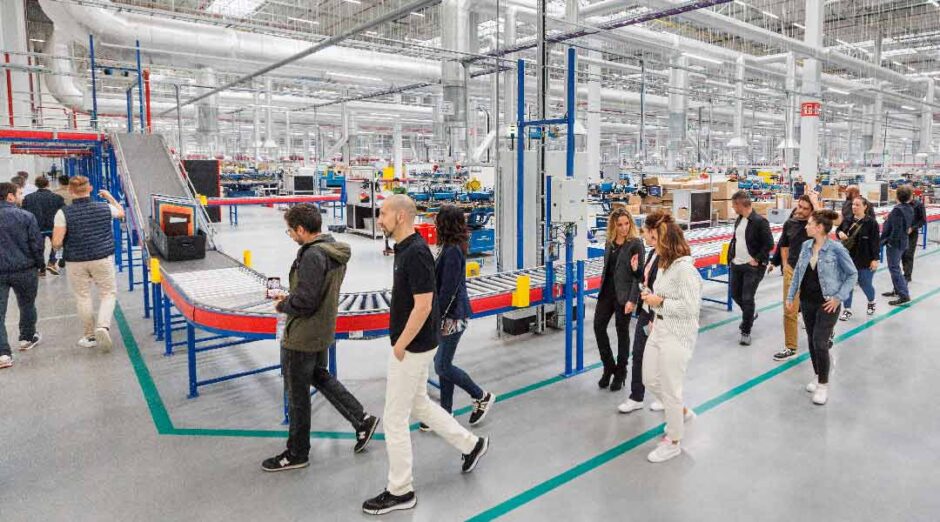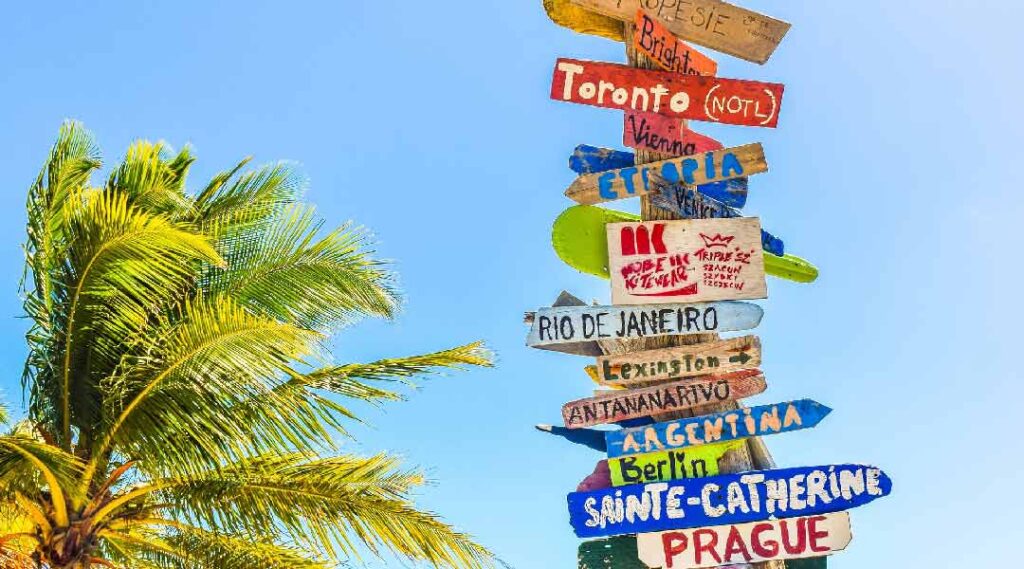
Imagine the impact of a corporate trip – be it for a seminar, rewarding your employees, or engaging in team-building activities – on your staff’s personal and professional growth. These trips facilitate strong connections, boost team cohesion, and leave your employees highly motivated upon their return to work. Our comprehensive guide will help you explore various trip options and select the best fit for your needs. Follow our 5-step plan to ensure optimal organisation.
Why Plan a Business Trip?
Business trips offer numerous benefits for your company. Whether they involve seminars or team-building activities, they have become essential in the professional world. Bringing your employees together in a different environment fosters strong bonds, enhances team spirit, and significantly improves cohesion within the company. These positive experiences also have a substantial impact on employee motivation, creativity, and loyalty.
More than just moments of relaxation, these trips serve as a crucial lever for building a positive and strong corporate culture. They support team cohesion and boost employee motivation through activities outside the professional setting. Additionally, they provide opportunities for professional development through seminars, workshops, and conferences. By investing in your employees’ growth, your company enhances its human capital and strengthens its appeal.
Key Objectives of Business Trips:
- Enhance Communication: Experience a different setting that encourages informal exchanges and discussions, fostering stronger connections among your team.
- Boost Motivation: Show your employees that they are valued and vital to the success of your organisation, driving their commitment and dedication.
- Increase Creativity: By changing the environment, ignite your team’s imagination and inspire the generation of innovative ideas.
- Improve Performance: Foster a more cohesive and efficient work dynamic within your teams, leading to enhanced productivity.
- Strengthen Brand Image: Organise a well-planned seminar trip that reinforces your company’s appeal as an employer, creating a lasting positive impression.
Consider gifting branded T-shirts or promotional caps to participants to further enhance team spirit. Additionally, offering travel-related items with your logo can make their stay comfortable and memorable.
Different Types of Business Trips
A wide array of corporate trips are available to cater to the unique requirements of any company, regardless of its size. Whether it’s a seaside seminar or a mountain retreat focused on wellness and team cohesion, the options are abundant. How do you make the right choice? Dive into our guide to discover the answer.
The Seminar Trip: Balancing Professionalism and Pleasure
Organising a seminar goes beyond being a mere business meeting. It is an event that seamlessly blends professional and personal aspects, creating an environment that fosters:
- Generating Strategic Thinking: Away from the conventional office setting, participants can approach business matters with renewed creativity. Through meetings and workshops, new goals are defined and innovative strategies are implemented.
- Strengthening Cohesion: Engaging in enjoyable activities and shared experiences helps forge stronger bonds among employees, encouraging communication and nurturing a robust team spirit.
- Personal and Professional Development: Many seminars offer training workshops, conferences, and team-building activities that empower participants to acquire new skills and unleash their full potential.
- Relaxation and Wellbeing: Alongside sports and cultural activities during free time, participants have the chance to recharge and indulge in a well-deserved break.

The Reward Trip: Show Appreciation and Motivate Your Employees
Reward trips are a highly effective motivational tool for businesses. They provide a way to thank employees for their dedication and performance, and offer the following benefits:
- Sense of Recognition: Reward trips provide an opportunity to show employees that their hard work is valued.
- Motivation: When employees feel appreciated and rewarded for their efforts, they develop an extra drive to achieve future business goals.
- Team Cohesion: The activities provided during reward trips foster interaction and strengthen bonds among employees, whether they are from the same department or different areas of the company.
- Employee Retention: Reward trips help enhance the sense of belonging to the company, encouraging loyalty and reducing employee turnover.
The Team Building Trip: Fostering Team Spirit and Motivation
Experience a transformative team building trip designed to elevate your team’s cohesion and motivation. Break away from the routine and immerse yourselves in interactive activities that will inspire and energise your team. This unique experience will not only develop new skills but also strengthen your team’s sense of belonging and commitment to the company.
Objectives of a Team Building Trip:
- Unite the Team: By sharing memorable experiences and tackling challenges together, team members forge a strong sense of unity and camaraderie.
- Enhance Communication: Engaging activities offer invaluable opportunities for participants to connect on a deeper level, fostering better communication.
- Develop Trust: Collaborative efforts during the trip build mutual trust, enabling employees to rely on and support each other more effectively.
- Stimulate Creativity: Fun and innovative projects inspire participants to step outside their comfort zones, sparking creative thinking and fresh solutions.
7 Key Steps to Plan Your Business Trip
Here are our top 7 tips to help you organise the perfect corporate trip:
1. Define Your Objectives:
What do you want to achieve with this trip? Start by asking yourself various questions to clarify your goals, which will streamline the planning process. Consider whether you aim to:
- Build connections between different departments?
- Enhance cohesion within a single team?
- Increase client loyalty?
- Motivate your sales team?
- Show appreciation to your employees for their hard work?
- And more…
2. Determine the Number of Travellers
With your objectives clear, it’s time to decide who will join the trip. Are you inviting the entire company, just one department, or your top clients?
Next, check everyone’s availability to get an exact count of participants. This will help you establish a budget, choose a destination, and plan activities accordingly.
3. Find the Ideal Destination

It’s time to choose your trip location. Consider a place that will be appreciated by as many people as possible. To determine this, conduct a survey with three pre-selected locations. This will help you identify the favourite choice of the majority.
Additionally, when selecting potential destinations, ensure they fit within your budget to avoid unexpected expenses.
4. Choose Your Mode of Transport
Depending on your chosen destination and budget, you’ll need to select your mode of transport:
- Is it possible to reach the location by train or bus?
- Is flying the fastest and most cost-effective option?
- Are car rentals available?
Additionally, make sure to research how to get from the station or airport to your accommodation. Check if it’s possible to travel directly to where you’ll be staying. Book your transport well in advance to secure the best prices.
To enhance the travel experience, consider providing a promotional travel kit with your logo, including a neck pillow, eye mask, and earplugs.
5. Book Suitable Accommodation
Choose accommodation that fits your budget and the number of travellers. Consider these questions:
- Is it more practical to rent a large house?
- Are hotel rooms a better option?
- Would booking apartments be ideal?
Selecting the right type of accommodation will ensure comfort and convenience for everyone.
6. Organise the Meals
If you choose a hotel, check if they offer half-board options. Otherwise, make reservations at nearby restaurants. You can allocate a budget for each participant to enjoy meals at their chosen restaurants or to spend on groceries if they prefer. Alternatively, consider using a catering service or arranging homemade meals for a more personalised touch.
7. Plan the Activities
With the trip details sorted, it’s time to organise the activities you’ll engage in at the destination. Remember, although this is a break from their regular work routines, the experiences will have a positive impact on productivity in the coming months. Ensure a mix of engaging, enjoyable, and team-building activities that align with your objectives for the trip.
Examples of Activities:
- Relaxation: Beach, spa, golf, etc. Ensure your employees have time to unwind and enjoy themselves.
- Fun and Creativity: Activities like sport games, treasure hunts, themed evenings, cooking and painting classes, etc. These games foster team spirit, communication, and problem-solving, while also sparking imagination and creativity.
- Cultural Visits: Museums, monuments, historical sites, etc. Explore new horizons and share cultural experiences together.
- Sports: Sailing, scuba diving, rafting, hiking, water sports, adventure courses, etc. These activities help expend energy, relieve stress, and strengthen team cohesion.

Conclusion
In essence, a business trip is far more than just a relaxation opportunity. It’s a strategic investment for any company. By strengthening team cohesion, stimulating creativity, and enhancing employee satisfaction, these trips contribute to overall better performance. So, don’t hesitate to provide your teams with memorable experiences through a tailored trip that will leave a lasting impression.